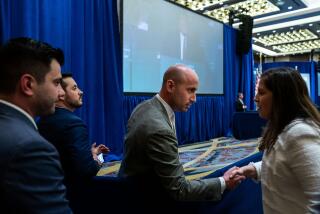Outgoing Solicitor General’s Prediction : Reverse Bias Seen as Key High Court Issue of 1980s
- Share via
WASHINGTON — Solicitor General Rex E. Lee, announcing his resignation as the government’s chief advocate before the Supreme Court, predicted Tuesday that “reverse discrimination” will be a dominant issue before the court for the rest of the decade.
Lee, stepping down after four years to work for a law firm and to teach part time, said in an interview that he decided to leave solely for financial reasons and that the arrival of Atty. Gen. Edwin Meese III had nothing to do with his departure.
Some Meese aides had been critical of Lee’s unwillingness to use the solicitor general’s post to argue for Administration positions that stood virtually no chance of being adopted by the justices. But, Lee said, he had seen no indication that Meese agreed with that view.
‘Big Issue’
Lee said he expects the “whole reverse discrimination area” to be a key question before the Supreme Court. “As I see the cases out there, this would be one of the big issues for the remainder of the decade,” he said.
He also said he supported, but had no role in, the Justice Department’s decision to seek to undo affirmative action court decrees, negotiated by the department in earlier administrations, on grounds that job quotas made them unacceptable.
Lee’s credentials as a legal conservative, established while he was dean of Brigham Young University Law School, seem unimpeachable. But, in 1983, he drew the wrath of archconservatives when he branded social issues such as abortion and prayer in the public schools as “an albatross around my neck.”
Differences in Administration
While contending that such disagreement had been “greatly exaggerated,” Lee acknowledged that he had had differences with others in the Administration over the extent to which the solicitor general’s office should be used to advocate broad principles with no chance of adoption by the high court.
“My principal audience does not consist of 1 million people, nor 100 people--it consists of nine (justices),” he said. “I am not the neighborhood essayist. I am not the person whose job it is to pronounce the general philosophy of the Administration. My job is to win cases before the Supreme Court.”
Lee said the Justice Department is taking “a very close look” at whether it will enter a Jackson, Mich., case to be argued next fall before the justices that presents a far-reaching but unresolved issue in the debate over affirmative action programs: whether public employers are free to dismiss white employees to protect the jobs of blacks with less seniority.
Ruling in Earlier Case
The justices last year barred courts from ordering municipalities to give minority workers preference in layoffs, even if they had less seniority. But they appeared to leave open the question of whether voluntarily adopted minority-preference programs are valid under the Constitution.
Lee cited several broad accomplishments achieved through the cases he and his staff argued and won before the Supreme Court. The justices’ rulings have made government more accommodating to religion, limited the ability of judges to overrule Congress and the President and strengthened the role of law enforcement authorities, he said.
Lee, 50, will leave office June 1 to join the Washington office of the firm of Sidley & Austin. He will also accept a teaching post at Brigham Young University.
More to Read
Get the L.A. Times Politics newsletter
Deeply reported insights into legislation, politics and policy from Sacramento, Washington and beyond. In your inbox twice per week.
You may occasionally receive promotional content from the Los Angeles Times.










